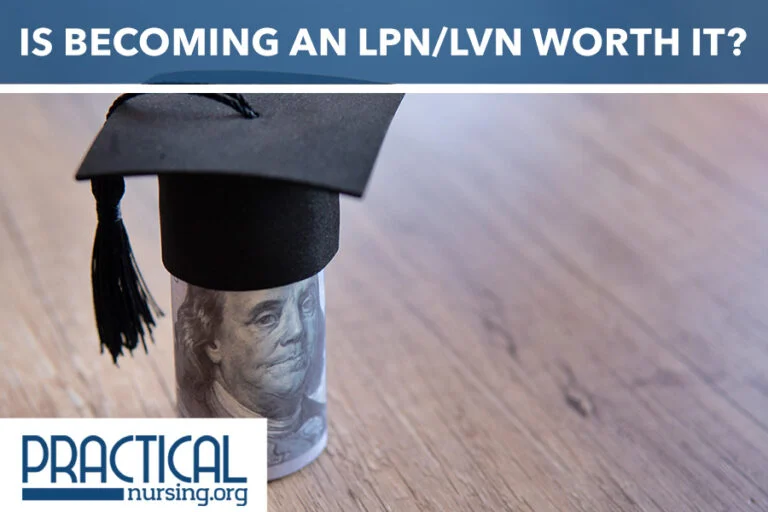Is Becoming an LPN/LVN Worth It?


 Choosing a career in nursing is a significant decision, and becoming a Licensed Practical Nurse (LPN) offers a unique and valuable pathway into the healthcare profession. This comprehensive guide will help you understand whether pursuing an LPN career is the right choice for your professional goals.
Choosing a career in nursing is a significant decision, and becoming a Licensed Practical Nurse (LPN) offers a unique and valuable pathway into the healthcare profession. This comprehensive guide will help you understand whether pursuing an LPN career is the right choice for your professional goals.
Understanding the LPN Role
Licensed Practical Nurses (LPNs), also known as Licensed Vocational Nurses (LVNs) in some states, play a critical role in patient care. These healthcare professionals provide fundamental nursing care under the supervision of registered nurses and physicians.
LPN Career Snapshot
| Career Metric | Details |
| Average Annual Salary | $48,070 |
| Education Duration | 12-18 months |
| Job Growth (2022-2032) | 6% (Faster than average) |
| Typical Work Settings | Nursing homes, hospitals, clinics, home healthcare |
| Certification Cost | $1,000 - $3,000 |
Benefits of Becoming an LPN
1. Faster Entry into Healthcare
- Shorter education timeline compared to RN programs
- Typically completed in 1-2 years
- Lower initial educational investment
- Quick path to starting a healthcare career
2. Affordable Education
- Lower tuition costs compared to four-year nursing degrees
- More accessible financial investment
- Shorter time away from potential earnings
- Multiple community college and vocational school options
3. Diverse Work Opportunities
LPNs can work in various healthcare settings:
- Long-term care facilities
- Hospitals
- Physician offices
- Home healthcare services
- Rehabilitation centers
- Schools and educational institutions
4. Career Advancement Potential
- Pathway to becoming a Registered Nurse (RN)
- Many employers offer tuition reimbursement
- Opportunity to specialize in specific healthcare areas
- Bridge programs make transitioning to RN easier
5. Meaningful Work
- Direct patient care
- Making a difference in patients’ lives
- Providing essential healthcare support
- Building relationships with patients and families
Potential Challenges
Before you embark on an LPN/LVN education program, be sure you know all the pitfalls of this career path.
Considerations Before Pursuing LPN Career
- Lower salary compared to RNs
- Limited advanced practice opportunities
- Physical and emotional demands
- Shift work and irregular hours
- Continuous learning requirements
Education and Certification Process
Steps to Become an LPN
- Complete an accredited practical nursing program
- Pass the NCLEX-PN examination
- Apply for state licensure
- Maintain ongoing certification and continuing education
Average Program Requirements
- High school diploma or GED
- Basic science and math prerequisites
- Criminal background check
- Healthcare worker immunizations
- CPR certification
Financial Considerations
Potential First-Year Earnings
- Entry-level: $35,000 – $42,000
- Experienced LPNs: $45,000 – $55,000
- Specialized areas can offer higher compensation
Learn more about LPN/LVN salaries.
Cost of Education
- Community college programs: $10,000 – $15,000
- Vocational school programs: $15,000 – $25,000
- Financial aid and scholarships often available
Learn more about the cost of LPN programs and schools.
Career Advancement Strategies
Paths for LPN Growth
- Specialize in specific healthcare areas
- Pursue RN degree through bridge programs such as the LPN to RN degree
- Gain certifications in:
- Wound care
- Gerontology
- IV therapy
- Pharmacology
- Explore management and leadership roles
Is an LPN Career Right for You?
Consider an LPN career if you:
- Enjoy direct patient interaction
- Want a quick entry into healthcare
- Prefer hands-on, practical work
- Have strong communication skills
- Are compassionate and detail-oriented
Emerging Trends in LPN Employment
- Increased demand in home healthcare
- Growing elderly population needs
- Expansion of outpatient care services
- Technological integration in patient care
- Remote monitoring opportunities
Learn more about LPN jobs.
Related Articles
- Pediatric Intensive Care Unit Nursing Careers with BSN
- LPN Continuing Education Units
- How to Prepare for Your LPN/LVN Program Entrance Exam
- We are Nurses – Core Values
- Military Nursing Careers with BSN
- 8 Roles of the LPN
- What to Expect Working in a Methadone Clinic
- Licensed Practical Nurse (LPN) vs Medical Assistant